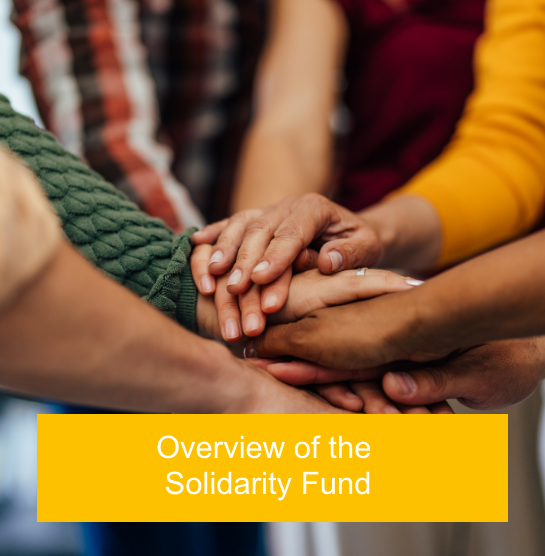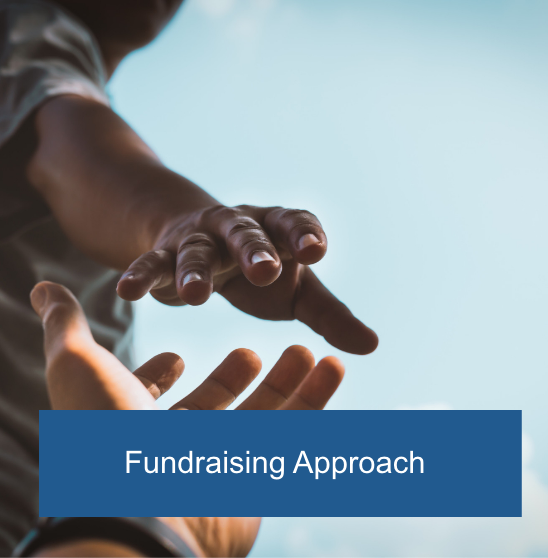Strategy and
Mandate
Development of the Solidarity Fund Strategy and Mandate
The Solidarity Fund was conceptualised as a platform through which individuals, the private and public sectors, philanthropic organisations, communities and other organisations could join together in responding to the COVID-19 pandemic.
The Fund mobilised and coordinated financial and in-kind contributions from all South Africans and members of the international community.
The overall design and development of the mandate was focussed on meeting local needs and the local context, whilst drawing on global responses to COVID-19. The Solidarity Fund also looked to the World Health Organisation (WHO) for guidance on how to set strategic objectives for the Fund’s Health Pillar, based on their response to the pandemic.
When the mandate was developed, the Board ensured that the right people were in the room who could help mobilise individuals to act. The Board defined what experience and expertise the Fund required and identified individuals who had well rounded experience where they could apply holistic business knowledge to various areas across the value chain.
Right at the outset as the Fund was being discussed, it was agreed that rather than exploring other strategies outside of the government-determined strategy to the pandemic, Solidarity Fund was to unite the nation in solidarity to augment government’s efforts. Sometimes acting in concert with government and sometimes partnering with other sectors of society to support the country’s strategy.
Mandate of the Solidarity Fund:
- The Fund was required to mobilise and coordinate financial and in-kind contributions from all South Africans and members of the international community.
- The Fund was required to use funds raised and other in-kind contributions to ameliorate both the health crisis and the social consequences of the pandemic.
- The Fund was required to bring South Africans together to play their part in combatting COVID-19.
The Fund initially established the following goals to be able to have the level of impact that could help the Fund execute on the mandate outlined above.
Detect and Care: Detect and understand the magnitude of the disease. Care for those in hospital or in need of medical care.
Support: Support those whose lives have been disrupted by the pandemic.
Prevent: Prevent the spread of the disease by supporting measures to "flatten the curve" and lower infection rates.
The strategic focus areas were further refined into three pillars – the health response, the humanitarian effort, and the behaviour change campaign. These pillars were chosen because it was where the Fund believed it could make the greatest contribution to supporting the national health response and ameliorating the impacts of the crisis on all residents of South Africa.
Many decisions had to be made under time pressure. The Fund ensured informed decision making by leveraging networks and partnerships. A key success factor was to leverage the right resources, with the right skills to solve the right problems. As the Fund continued operations, the Fund adopted other approaches including situational analyses which were more robust, albeit time consuming.
It was important as an NPO to develop and design a strategy that achieved quick and impactful action. The Fund started during a difficult time where work was conducted remotely. It was important to develop a people strategy to ensure integrated leadership that would filter down in the organisation.
The objective in the Memorandum of Incorporation (MOI) should be carefully considered to ensure in the initial phase the mandate is clearly circumscribed. The MOI needs to be fit for purpose and when there is a need for change, consideration should be given for broader wording as reflects changed circumstances. The Fund had to update their MOI twice to respond appropriately to the Humanitarian Crises following the July 2021 Unrest and the Floods in KwaZulu Natal, which also affected Gauteng and the Eastern Cape respectively.
Considering South Africa’s economic position, it is important that there be deliberate procurement from South African businesses with a deliberate inclusion of players that have been historically and systemically excluded from economic participation. There was an initial perception that the Fund was biased in favour of international players and large, well established South African companies. The Fund developed a procurement policy that ensured a diversity of suppliers and partners, based on parameters that included ownership, size of operation, geographic presence (national, provincial, local, urban, rural) and experience. To enable this, deliberate action has to be taken.
Implementing a performance measurement framework for implementation partners to assess the capacity of the smaller organisations they support will help to build a database of such partners for future projects.




